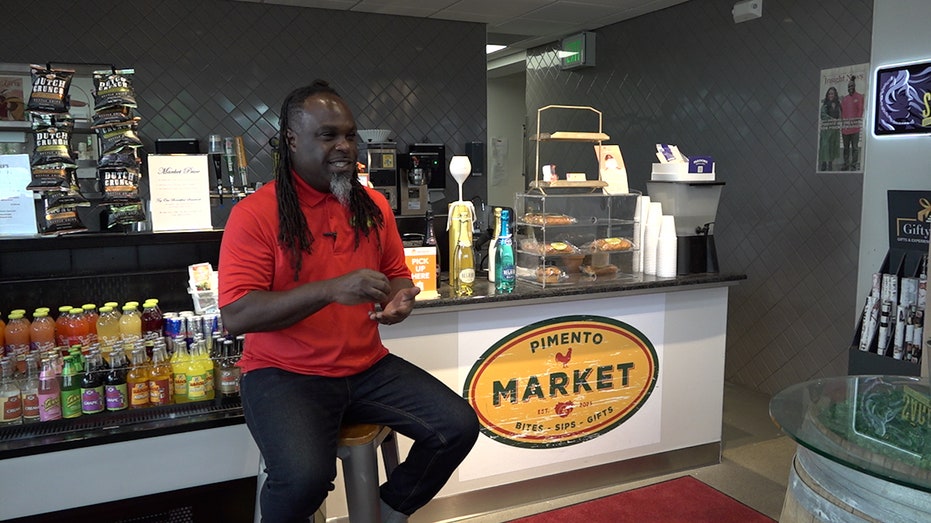A record number of Americans have begun taking the risk to start their own businesses as many blame a poor economy for their new ventures. The U.S. Chamber of Commerce says entrepreneurship has risen over the last year, and a rising force among the 5.5 million Americans who applied to start their own businesses are Black women.
Melanie Lewis spent years working in Minneapolis restaurants as a pastry chef, until 2015. She created her company, Perfect Piece Sweets Co., featuring custom-designed cakes and treats for weddings or other parties. She was utilizing Minnesota’s Cottage Food Law, which allows people to sell food and canned goods without a license.
“I’ve made other businesses and other companies so much money. Why not take all my brain power and create something for myself?” Lewis asked.
SURGE IN US SMALL BUSINESSES STARTED AS SIDE HUSTLES
It didn’t become her full-time career until 2023, and she’s the only one on her payroll.
“April 7 of this year was my first full year being a full-time entrepreneur,” Lewis said.
In August 2023, she took her business to the next level when she got her wholesaler license to allow her to sell her goods in retail stores. Her artisan chocolate truffle assortment boxes are now for sale in a few local Minneapolis restaurants.
“It’s just been like weddings, weddings, weddings, weddings, weddings, which I love. Because they allow me to be creative,” Lewis said about her business. She’s hoping to expand her desserts to corporate parties and networking events.
She’s a part of the fastest growing group of entrepreneurs in the U.S. — Black women. A GoDaddy research report found that there has been a 70% increase in the number of Black women-owned businesses since the start of the pandemic.
SMALL BUSINESS OWNERS REVEAL ‘OUT OF THIS WORLD’ IMPACT TO THEIR BOTTOM LINES
But Black entrepreneurs face certain roadblocks. The Federal Reserve says Black entrepreneurs are twice as likely to be denied a loan compared to white business owners.
“Entrepreneurship is still the way to build that generational wealth. And a small business is the best opportunity there is,” said Dorothy Bridges, the president and CEO of the Metropolitan Economic Development Association (MEDA).
MEDA, which helps minority owned businesses get grants or loans, relies on support from donors and federal and state funding.
Pimento Jamaican Kitchen is one of the businesses MEDA has helped over the years. In 2013, the restaurant won its first brick and mortar on a Food Network reality show.
“So, imagine that we have one location from the Food Network reality show and still can’t find capital to move to our second location. And that’s when MEDA was able to step in since day one, to help us figure out how to expand and grow,” owner Tomme Beevas said.

They have since expanded to multiple locations around the Twin Cities, including their latest location on Bde Maka Ska lake in Uptown Minneapolis.
“A lot of folks recognize that the nine to five simply isn’t the only solution,” Beevas said. He quit his corporate job in 2014 to work on building the Pimento Jamaican Kitchen brand.
Beevas says the hurdles for Black entrepreneurs are high.
“What we’ve done in America is created two separate banking systems, one for one group, the traditional white group, and then the other for minorities. And those are the nonprofit lenders, right? Normally you’d never find a white person go into a nonprofit lender for funds to get started,” Beevas said.
ECONOMISTS PREDICT MUCH STRONGER GROWTH IN 2024. HERE’S WHY
The U.S. Chamber of Commerce says entrepreneurship is up across the country, and that technology has been the great equalizer.
“Never before in our history, has it been easier for one person to compete against global businesses, because of technology as it is right now,” vice president of small business policy Thomas Sullivan said.
Sullivan says 80% of America’s small businesses don’t have employees, like Lewis at Perfect Piece Sweets.

“Ninety-five percent of small businesses are happy with their decision to start a small business,” Sullivan said. “That says it all. Happiness isn’t just about having it easy. Happiness is being your own boss, being able to take control of your life when it comes to flexibility.”
Sullivan says artificial intelligence and sustainability businesses are also driving the growth in new businesses.
John Stavig is the program director for University of Minnesota’s Gary S. Holmes Center for Entrepreneurship. Despite the boom in business, Stavig says there is still a possibility for a recession.
“I don’t think anybody’s assuming that we’re out of the woods yet, from the economy, and there are some concerning signals there,” Stavig said. “The increase in new businesses and the increased flexibility of the individuals in our economy, you know, are a great sign for more flexibility and more resilience in terms of the economy.”
With new businesses forming, Stavig says there’s a possibility of at least some portion of the population who can create their own opportunities.
Read the full article here


















